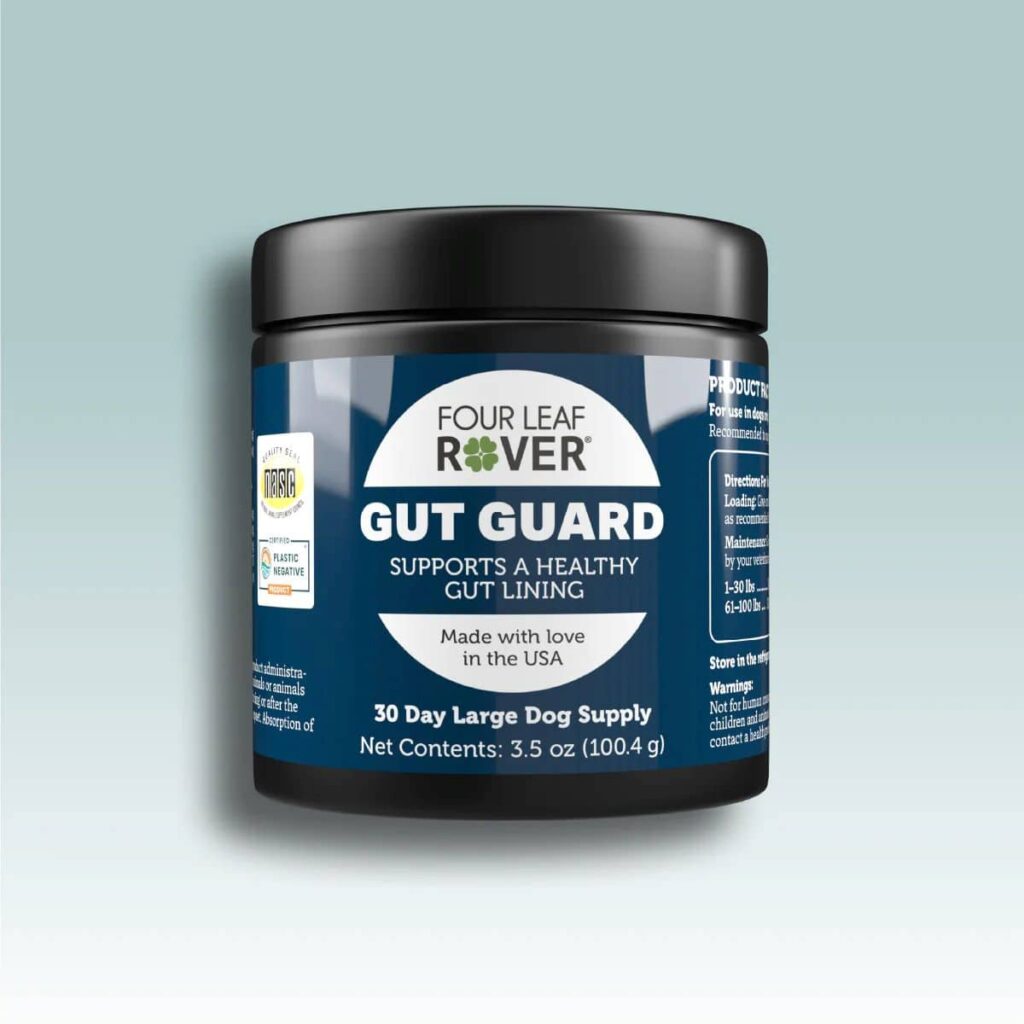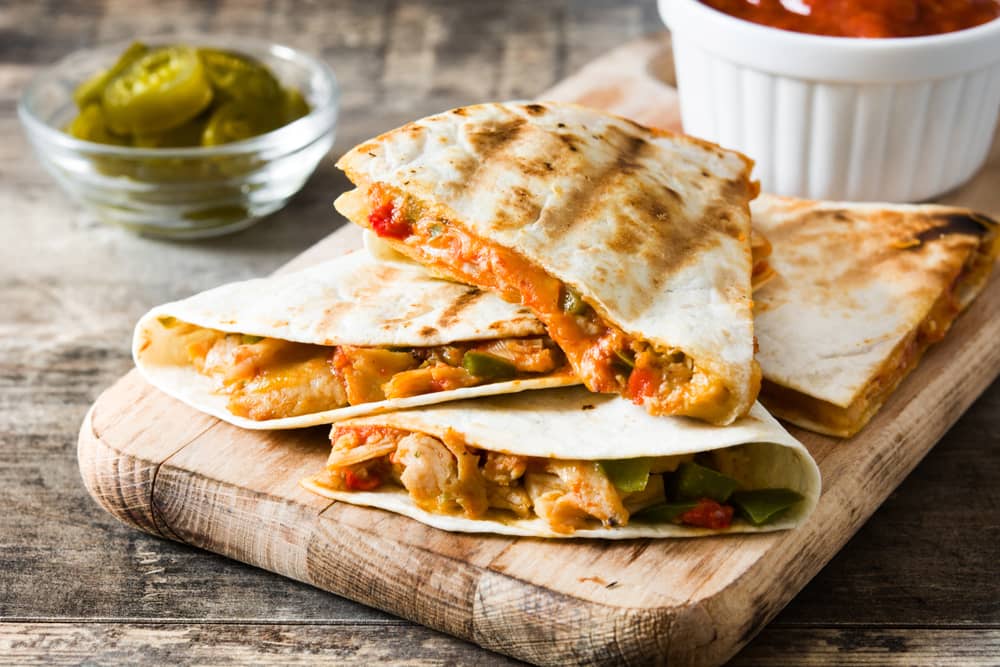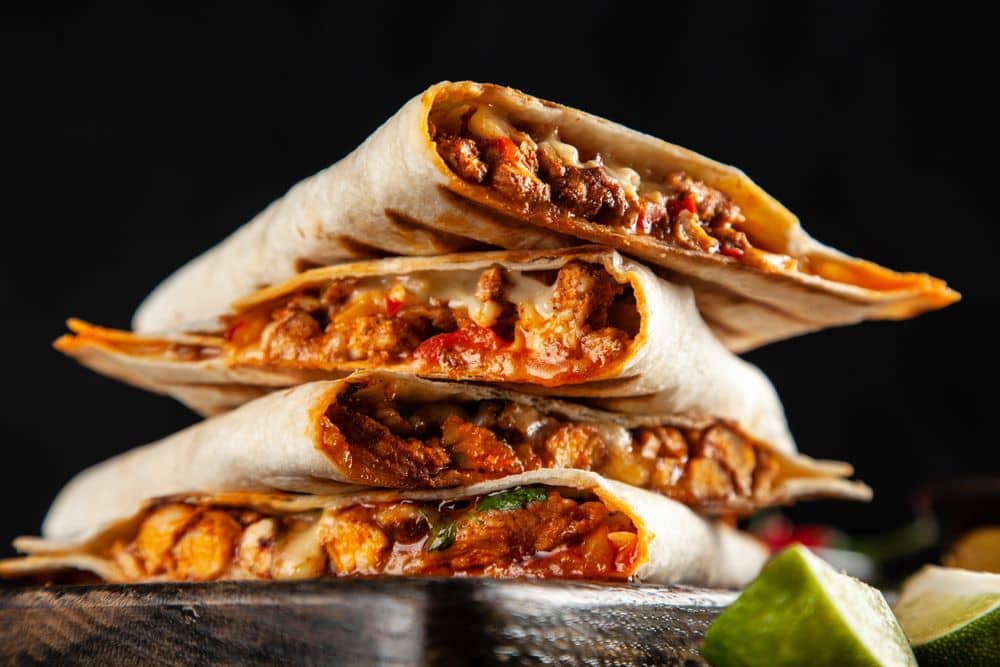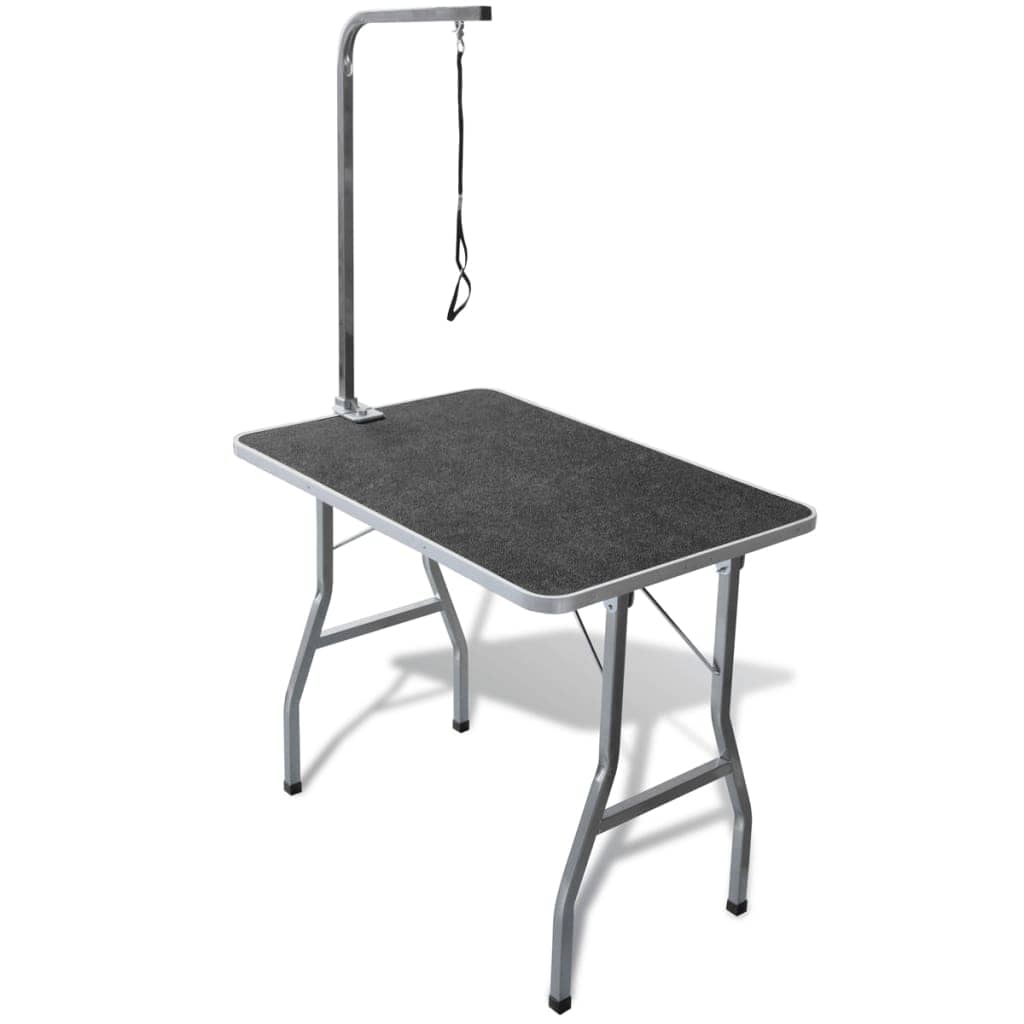Can Dogs Eat Quesadillas? – Ultimate Guide
If you’re a dog owner and found yourself wondering whether it’s safe to share a delicious quesadilla with your dog. In this article, we’ll dive deep into the topic and explore the question, “Can dogs eat quesadillas?”
Join us as we uncover the potential risks and benefits of feeding and making quesadillas to your dog.

Quesadillas are a famous dish in the South American region. People there are crazy about this cuisine. It also became famous in Asia, Europe, and Australia. It is good in taste, but it also has some effects on the health of dogs if taken by them.
Some dogs are not affected by quesadillas, but some have to suffer from digestive distress and other problems.
Can dogs have Quesadillas? What are quesadillas?
Can dogs eat quesadillas with full of pleasure? But what are quesadillas? Quesadillas means a “little cheesy thing”. Quesadillas are a Mexican cuisine that is prepared from a tortilla bread consisting of meat, beef, and cheese. Some restaurants also add other sauces so they can increase the variety and taste.
Traditionally, it is made from masa dough (corn tortilla) in the southern and central regions, but nowadays it is prepared from flour. It is filled with cheese in Mexico, but all over the world, it has a different distribution of ingredients.
Food & Nutrients for Dogs
Food and Dietary Requirements
- Banana: Dogs can enjoy the natural sweetness and health benefits of bananas in moderation.
- Asparagus: A nutritious veggie that can be a crunchy and tasty treat for your furry friend.
- Strawberry: Rich in vitamins, strawberries make a delightful occasional snack for dogs.
- Orange Chicken: Plain cooked chicken without spices or sauces can be a safe protein source for dogs.
- Almond Butter: Avoid almonds, but dogs can indulge in unsalted and unsweetened almond butter as an occasional treat.
- Quesadilla: Plain tortilla with a small amount of cheese can be a simple treat for dogs.
- Pita Bread: A small piece of plain pita bread can be given as an occasional snack.
- Ricotta Cheese: Dogs may enjoy a little ricotta cheese as an occasional treat, but avoid excessive amounts.
- Provolone Cheese: Offer a tiny piece of provolone cheese as a special reward for your furry companion.
- Banana Pudding: Plain banana pudding without additives or artificial sweeteners can be an occasional treat.
- Watermelon: A refreshing and hydrating fruit that dogs can enjoy in small, seedless portions.
- Coffee Chew Wood: Coffee and any type of wood should be kept away from dogs, as they are harmful.
- Oatmeal Cream Pie: Avoid sugary snacks like oatmeal cream pies, as they are not suitable for dogs.
- Teriyaki Sauce: Skip the teriyaki sauce, as the high sodium content is unhealthy for dogs.
- Mushroom Cream Soup: Keep creamy soups, especially those with mushrooms, away from your furry friend.
Vitamins Pros and Cons
Vitamins and Nutritional Pros and Cons
- Banana:
- Vitamin B6:
- Pros: Supports metabolism, immune system, and red blood cell production.
- Cons: Overconsumption may cause gastrointestinal upset due to high fiber content.
- Vitamin C:
- Pros: Acts as an antioxidant, boosts the immune system, and promotes healthy skin.
- Cons: Dogs produce their own vitamin C, so supplementation is usually unnecessary.
- Vitamin B6:
- Asparagus:
- Vitamin A:
- Pros: Essential for vision, immune function, and cell growth.
- Cons: High-fiber content may lead to stomach upset if given in large quantities.
- Vitamin C:
- Pros: Supports the immune system and helps absorb iron.
- Cons: Overfeeding may lead to gas or mild digestive issues.
- Vitamin A:
- Strawberry:
- Vitamin C:
- Pros: Provides a boost to the immune system and has antioxidant properties.
- Cons: Should be given in moderation due to natural sugars.
- Vitamin C:
- Orange Chicken:
- Vitamin B6:
- Pros: Supports metabolism and brain health.
- Cons: Avoid giving chicken with spices or sauces, which can be harmful.
- Vitamin B6:
- Almond Butter:
- Vitamin E:
- Pros: Protects cells from damage and promotes healthy skin and coat.
- Cons: Almonds themselves can be a choking hazard, so avoid direct consumption.
- Vitamin E:
- Quesadilla:
- Vitamin B6:
- Pros: Supports energy metabolism and nervous system function.
- Cons: High-fat content in cheese may lead to weight gain if given excessively.
- Vitamin B6:
- Pita Bread:
- Various B Vitamins:
- Pros: Essential for energy metabolism and nerve function.
- Cons: Pita bread can be high in carbohydrates, so feed in moderation.
- Various B Vitamins:
- Ricotta Cheese:
- Vitamin A:
- Pros: Important for vision and immune system support.
- Cons: High-fat content, so feed in small amounts to avoid weight gain.
- Vitamin B12:
- Pros: Supports nerve function and red blood cell production.
- Cons: Excessive consumption may lead to gastrointestinal upset.
- Vitamin D:
- Pros: Aids calcium absorption and supports bone health.
- Cons: Over-supplementation can lead to toxicity, as dogs can’t regulate vitamin D as effectively as humans.
- Vitamin K:
- Pros: Crucial for blood clotting and bone health.
- Cons: Excessive vitamin K can interfere with blood-thinning medications.
- Calcium:
- Pros: Essential for bone and teeth health, muscle function, and nerve transmission.
- Cons: Over-supplementation can lead to skeletal problems and urinary issues.
- Vitamin A:
- Provolone Cheese:
- Vitamin A, Vitamin B12, Vitamin K, Calcium:
- Pros: Similar to ricotta cheese, these vitamins and minerals offer various health benefits.
- Cons: High-fat and sodium content, so feed in moderation to avoid health issues.
- Vitamin A, Vitamin B12, Vitamin K, Calcium:
- Banana Pudding:
- Vitamin B6:
- Pros: Supports metabolism and various body functions.
- Cons: Pudding may contain added sugars and artificial ingredients, which are not suitable for dogs.
- Vitamin B6:
- Watermelon:
- Vitamin A, Vitamin B6, Vitamin C:
- Pros: Provide essential vitamins and hydration.
- Cons: Remove seeds and feed seedless watermelon in small portions to prevent choking.
- Vitamin A, Vitamin B6, Vitamin C:
Did Dogs Eat Quesadillas Ever- Explore History
Quesadillas are very famous street food in Mexico and the American region. It is served with different types of sauces, cheese, and meat. It was first mentioned in an Italian cookbook in the 16th century. Where it was prepared with corn tortillas.
The Spanish conquistadors brought it to Mexico, where it was then prepared with flour tortillas. The flour tortilla quesadilla became very famous in the southern Mexican region and was adopted very commonly by the people of Mexico.
It became a very popular street food in Mexico and was served around the world in Mexican restaurants.
How are Quesadillas Made?
Tortillas are first filled with fillings, cheese, and other substances like sauces. Heated over a low flame, and no oil is applied to the pan before putting the tortilla in it because oil enhances the conduction of heat, the tortilla gets brown very quickly, and the internal filling is unheated with non-melted cheese.
Because tortillas are thin and get easily cooked on a low flame,
Then cover the lid so that the heat can be distributed easily, and the internal cheese is starting to melt easily. Then a crucial step came flipping the tortilla.
First of all, don’t lose any filling during flipping; gently hold it with a spatula and flip. Now cook for 2 to 3 minutes so that it becomes crispy, and the cheese becomes molten. Cut the quesadilla into two halves.

Nutritional Contents of Quesadillas
| Nutrition Facts | |
|---|---|
| Serving size per 100grams | |
| Calories 293 | |
| % Daily Value | |
| Total Fat: 15g | 20% |
| Saturated fat: 6g | 40% |
| Cholesterol 37mg | 17% |
| Sodium 745mg | 3% |
| Potassium 183mg | 3% |
| Total Carbohydrates: 24g | 1% |
| Dietary fiber: 1.7g | 0% |
| Sugar 1.9g | |
| Protein 15g | 30% |
| Vitamin C 0% | Calcium 26% |
| Iron 9% | Vitamin D 2% |
| Vitamin B6 5% | Cobalamin 3% |
| Magnesium 6% | |
Ingredients of a Quesadilla
| Ingredients | |
|---|---|
| Tortillas | Salt and peppers |
| Chicken | Avocado |
| Onions and garlic | Butter |
| Cheese | Olive oil |
Gut Guard – For Dogs with Irritated Guts

- Gut Guard: A veterinary formulated blend of probiotics and herbs designed to support a normal inflammatory response in the gut and immune system of dogs.
- Supports Gut Health: Many foods, toxins, chemicals, and drugs have the potential to damage the gut lining, making it more permeable, leading to digestive issues.
- Prevents Toxin Leakage: By promoting a healthy gut lining, Gut Guard helps prevent toxins from escaping the gut, reducing the risk of health and immune issues in dogs.
- Combination of Probiotics and Herbs: The unique blend of probiotics and herbs in Gut Guard work synergistically to support gut health and immune function.
- Veterinary Formulated: Developed by veterinary experts to ensure the best possible support for canine digestive and immune systems.
Harmful Ingredients for Dogs

Onion and garlic
Onions and garlic are not good for dogs. They will not be able to sustain it. Onion and garlic contain N-propyl disulfide. N-propyl disulfide is not good for a dog’s health; it may destroy red blood cells, which carry oxygen throughout the whole body, and cause anemia-like conditions. It may also cause hemolytic anemia.
Some other symptoms are also shown in dogs, like lethargy, weakness, decreased appetite, pale gums, fainting, and reddish urine. Sometimes, it may also cause the dogs’ deaths if the conditions become more severe.
If anything like this happens, please contact your veterinary doctor. There are some other ingredients, like chives, that may cause abrasive damage to the dog’s health.
Seasonings
There are a lot of seasonings used in quesadillas; some are dangerous for dogs and some are not. It basically depends on the potency of spices and different types of ingredients.
It mostly contains chili powder, jalapenos, mustard, and a variety of other ingredients. Some ingredients are very harsh on the health of dogs; they may cause some digestive distress and other complications.
Dairy intolerance
Some dogs are lactose intolerant, which means they cannot consume anything that contains lactose sugars. If anything like this is present in your quesadillas, you can’t give it to your dog. This happens because they don’t contain an enzyme responsible for the breakdown of lactose sugar.
When they are infants, their bodies are unable to produce lactase, so that’s why their bodies are called lactose intolerant. If they consume any kind of dairy product, their bodies show some bad results. It may cause bloating, dehydration, weight loss, and weakness.
Salt concentration
An increase in salt concentration may harm the health of your dog. If this diet has a high amount of salt, can dogs eat Quesadillas? Yes, but a high level of salt can be harmful for dogs. A high amount of salt is also known as hypernatremia.
A high level of salts means a high level of sodium in the body. A high level of sodium absorbs more water from body cells into the blood to compensate for the effect of salt in the blood. This may cause shrinkage of cells and damage to nervous tissues. It may also contain cardiovascular diseases.

Artificial chemicals
Artificial chemicals are used to preserve food to increase its durability and enhance its taste. They are used to prevent the spoilage of bacteria and fungi. They contain BHA and BHT, which are proven to cause cancer in animals, still can dogs eat quesadillas?
Ethoxyquin can also cause some serious health disorders like liver damage, kidney damage, and cancer.
If your dog is surviving any of these health issues, you should consult your veterinary doctor, who may help you find the solution to the disorder.
Then try to find suitable healthy and organic food for your furry friend. Some dogs are also allergic to additives and preservatives that are not good for their health and may cause health complications.
It only happens when the body’s immune system senses the allergic particle in the dog’s diet and produces serious action in that response. If anything like this happens, it may cause serious gastrointestinal disorders like nausea, vomiting, and diarrhea, as well as some itching and skin irritations.
Read More: Dog Howling in Sheep – Ultimate Guide
Too Many Calories
Quesadillas are higher in calories due to the high content of cheese and oil in them. If your dog has food that contains more calories than the average daily diet of food, It may cause obesity-like disorders in dogs. Quesadillas are also rich in sugary substances, which may cause issues like diabetes.
How Can it be Harmful To Dogs?
Quesadilla is a Mexican dish that is very famous around the world due to its tempting taste. Can dogs eat quesadillas If it can be harmful to your dog?
Yes in a few conditions, if you want to feed it to your dog, it can cause some complications. It has some ingredients like cheese, which is high in fat; spices and seasonings irritate dogs’ stomachs; avocado also contains high fat.
Which is responsible for weight gain; sometimes dogs ingest harmful substances that are not good for their health and can upset their digestive systems. Sometimes dogs are allergic to some ingredients, so it’s better to get rid of those ingredients from your dog’s diet.
Can Dogs Eat Quesadillas?
Dogs were given quesadillas as a treat on special occasions. If you want to offer your dog quesadillas, you have to take care of the daily diet chart and the ingredients to which dogs are allergic. You have to remove those ingredients from quesadillas, which may harm the dog’s health.
Can dogs eat quesadillas on a healthy diet just? No, it is better to have ingredients that are healthy for our dog, like cucumber, carrot, etc. If you want to introduce new treats to your dog, it’s better to consult your veterinary doctor first before making your decision.

Adjustable Pet Dog Grooming Table with 1 Noose

- Professional grooming table suitable for pet dogs and cats.
- Ideal for bathing, trimming, drying, and grooming your pets.
- Rubber surface ensures pets’ safety during grooming sessions.
- Rugged surface makes it easy to clean, with hair and debris easily wiped down.
- Features a clamp-on adjustable grooming arm and security noose for convenience.
- Made of a solid iron frame, providing sturdiness and durability for long-term use.
Summary
In this article, we explored, “Can Dogs Eat Quesadillas?” Quesadillas are a Mexican dish that originated in Italy but became famous in Mexico. It was brought by Spanish people from Europe to South America. Firstly, its tortilla was prepared from corn as per tradition, but the Spanish tried to make it with flour in Mexico.
It contains cheese and chicken as the main filling ingredients. It also contains different sauces and additional ingredients like onions, avocado, tomatoes, and cabbage. It is famous around the world, and in different regions, it has different distributions of ingredients.
It was prepared by heating the tortilla without any grease, then putting all the mixture of filling and seasonings inside the tortilla and folding it, then putting it into the pan and placing the lid on it. After some time, the heat remained constant inside the pan, and the cheese melted.
Then flip the tortilla and serve it with some traditional sauce. Quesadillas are given to the dog, but they contain some harmful materials in them, like cheese, which contains sugar and fat in high amounts, which is responsible for causing heart and stomach issues, and onion and ginger, which contain some harmful substances that cause some major complications to the dog’s health.
It is better to give your dog healthy treats, and in the case of quesadillas, you can also skip harmful ingredients and give them to your dog. I think now it is clear, can dogs eat Quesadillas or not? If any of the complications occur, visit your veterinary doctor immediately.





